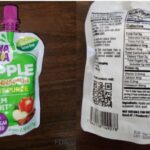The FDA is warning parents about the dangers of benzocaine and lidocaine in products used for treating teething pain in children. These topical medications offer little to no benefit and are associated with serious risks. The products include creams, gels, and homeopathic teething tablets. Benzocaine is a local anesthetic that temporarily numbs. It is the active ingredient in several nonprescription oral health care products, including Anbesol, Cepacol, Chloraseptic, HurriCaine, Orabase, Orajel, and Topex. These products should not be used for teething pain in children because they can be dangerous. Using benzocaine products can lead to a serious, and sometimes fatal, condition called methemoglobinemia, in which the oxygen-carrying capacity of red blood cells is greatly … [Read more...]
FDA Revokes Regulation Allowing Brominated Vegetable Oil
The FDA has revoked the regulation allowing brominated vegetable oil (BVO) in food. This oil is modified with bromine. He agency concluded that the intended use of BVO in food is no longer considered safe. A series of studies conducted in collaboration with the National Institutes of Health found the potential for adverse human health effects from the use of brominated vegetable oil. The FDA announced plans to ban this product last year. And the state of California banned BVO along with other compounds before the FDA announced their decision. Brominated vegetable oil was removed from the Generally Regarded as Safe (GRAS) list in 1970. It was used in small amounts to keep the citrus flavoring from floating to the top in some beverages. Few beverages in the United States contain … [Read more...]
Fourth of July Food Safety Tips From the USDA
The USDA is offering Fourth of July food safety tips so you can have a great celebration and offer safe food for your family and friends to enjoy. It's easy: just follow the four steps of clean, separate, cook, and chill. When you are serving guests of varying ages and health concerns, it's very important to make sure that the food at your party or gathering is wholesome and safe. That means you need to follow certain steps in the kitchen to the letter. They are: CLEAN. Wash your hands and surfaces such as countertops often. Hands should be washed for 20 seconds with clean water and soap. (Sing Happy Birthday to You twice for accurate timing.) If no running water is available, use hand sanitizer or moist towelettes that contain at least 60 percent alcohol. SEPARATE. Separate … [Read more...]
Dollar Tree Sold WanaBana Cinnamon Apple Products After Recall
Dollar Tree sold WanaBana Cinnamon Apple products after they were recalled for "extremely high concentrations of lead," according to an FDA warning letter. The investigation into the lead levels in those products started in October 2023. A recall was issued on October4 29, 2023. The recall was "ineffective" at Dollar Tree stores through December 19, 2023, the FDA states. The warning letter states, "Subsequent recall audit checks of your Dollar Tree and Family Dollar/Dollar Tree combination stores (collectively referred to as your “Dollar Tree stores”) revealed that you continued to offer the recalled WanaBana Apple Cinnamon Fruit Puree pouches on store shelves well after the recall was initiated, despite FDA’s numerous attempts to bring this serious issue to your attention." The … [Read more...]
Alert: Wow Bao Bao Thai-Style Curried Chicken Has Soy, Sesame
The USDA has issued a public health alert that Wow Bao Bao Thai-Style Curried Chicken contains soy and sesame, two of the nine major food allergens, that are not declared on the package label as required. The product may actually contain teriyaki chicken bao, which is made with soy and sesame. Anyone who is allergic to soy and/or sesame could have a serious reaction if they eat this product. No confirmed reports of adverse reactions have been received by the company to date. The recalling firm is Wow Bao. The fully cooked, frozen bao curry chicken product was packaged on March 20, 2024. The recalled item is 10 ounce boxes that contain four "Wow Bao Bao Thai-Style Curry Chicken" pouches. The best if used by date that is printed on the side of the box is 4/12/25. The product has … [Read more...]
Do Not Eat Certain Shellfish From OR and WA Because of PSP
The FDA says consumers should not eat certain shellfish harvested from Oregon and Washington waters because they may be contaminated with paralytic shellfish poison (PSP). Restaurants and retailers should not sell these products. Retailers and restaurants in Arizona, California, Colorado, Hawaii, Nevada, New York, Oregon, and Washington may have purchased oysters and bay clams from growing areas in Netarts Bay and Tillamook bay, Oregon harvested on or after May 28, 2024. All shellfish from growing areas in Willapa Bay, Washington Stony Point, harvested between May 26, 2024 and May 30, 2024;5/26/24; from Bay Center, harvested between May 29, 2024 and May 30, 2024; and Bruceport, harvested between May 29, 2024 and May 30, 2024 are included. Consumers in Arizona, California, … [Read more...]
Raw Milk Consumption May Put People at Risk of Avian Influenza
Raw milk consumption may put people at risk of catching Highly Pathogenic Avian Influenza (H5N1), according to the Oregon Health Authority. This virus, also known as the bird flu, has now started infecting dairy cattle across the country. Dean Sidelinger, M.D., M.S.Ed., health officer and state epidemiologist at OHA, said in a statement, "We know that if H5N1 is present in the milk of infected dairy cattle, it will be killed by pasteurization. Drinking raw milk carries many health risks, and those risks may now include H5N1 infection.” The FDA has tested 297 retail milk sample from 38 states for the H5N1 virus. About 20% of those samples tested positive for viral fragments, but none contained the live infectious virus because it is destroyed through pasteurization. There are … [Read more...]
Memorial Day Food Safety Tips From USDA to Stay Safe
These Memorial Day food safety tips from the USDA will help you and your family stay safe this summer. Summer cooking and parties are prime time for possible food poisoning cases for several reasons. Warmer temperatures and outdoor picnics, parties, and grilling pose special challenges. Under Secretary for Food Safety Dr. Emilio Esteban said in a statement, "The bacteria that cause foodborne illness love the summertime as much as we do because they thrive and multiply quickly in warmer temperatures. This causes illnesses to spike during the summer. As we all spend more time outside, it is important to remember these food safety steps to keep your friends and family safe." First, always wash your hands thoroughly with soap and water before you start cooking and eating. If safe … [Read more...]
FDA Takes Tara Flour Off Generally Regarded as Safe List
The FDA has removed tara flour from the generally regarded as safe list (GRAS) after illnesses associated with the product Daily Harvest Leek and Lentil Crumble illnesses were reported. There were reports of 393 illnesses associated with that product in 2022. At least 133 people were hospitalized, and some of the patients went into liver failure. Tara flour is now regarded as an unapproved food additive. These items are deemed to be unsafe under the Federal Food, Drug, and Cosmetic Act. That type of flour was used by Daily Harvest in a leek and lentil crumble product. The firm voluntarily recalled the product and conducted their own root cause analysis. The FDA has found no evidence that tara flour caused the outbreak, but it did prompt the agency to evaluate the status of that … [Read more...]
One-Third of Food Outbreaks Linked to Non-Irradiated Food
One-third of food outbreaks are linked to non-irradiated foods, according to a report in the Centers for Disease Control and Prevention's Emerging Infectious Diseases report for June 2024. Those foods are eligible for irradiation treatment, which kills pathogens and extends the life of produce and other foods. Of 482 outbreaks, 155 were linked to an irradiation-eligible food; none of those foods were irradiated. Irradiation is controversial, with some significant consumer resistance and large fixed costs. The FDA has approved certain foods for this type of treatment, including poultry, fresh shell eggs, spices, and meat. The FDA says that food irradiation is safe, and can control pathogens and insects. It can reduce the use of pesticides on foods, and can preserve food for … [Read more...]













